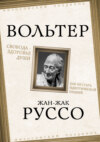Buch lesen: «A Philosophical Dictionary, Volume 08»
MONEY
A word made use of to express gold. "Sir, will you lend me a hundred louis d'or?" "Sir, I would with all my heart, but I have no money; I am out of ready money." The Italian will say to you: "Signore, non ha di danari" – "I have no deniers."
Harpagon asks Maître Jacques: "Wilt thou make a good entertainment?" "Yes, if you will give me plenty of money."
We continually inquire which of the countries of Europe is the richest in money? By that we mean, which is the people who circulate the most metals representative of objects of commerce? In the same manner we ask, which is the poorest? and thirty contending nations present themselves – the Westphalian, Limousin, Basque, Tyrolese, Valois, Grison, Istrian, Scotch, and Irish, the Swiss of a small canton, and above all the subjects of the pope.
In deciding which has most, we hesitate at present between France, Spain, and Holland, which had none in 1600.
Formerly, in the thirteenth, fourteenth, and fifteenth centuries, the province of the papal treasury had no doubt the most ready money, and therefore the greatest trade. How do you sell that? would be asked of a theological merchant, who replied, For as much as the people are fools enough to give me.
All Europe then sent its money to the Roman court, who gave in change consecrated beads, agnuses, indulgences plenary and limited, dispensations, confirmations, exemptions, benedictions, and even excommunications against those whom the subscriber chose, and who had not sufficient faith in the court of Rome.
The Venetians sold nothing of all this, but they traded with all the West by Alexandria, and it was through them only that we had pepper and cinnamon. The money which went not to the papal treasury came to them, excepting a little to the Tuscans and Genoese. All the other kingdoms of Europe were so poor in ready money that Charles VIII. was obliged to borrow the jewels of the duchess of Savoy and put them in pawn, to raise funds to conquer Naples, which he soon lost again. The Venetians supported stronger armies than his. A noble Venetian had more gold in his coffers, and more vessels of silver on his table, than the emperor Maximilian surnamed "Pochi danari."
Things changed when the Portuguese traded with India as conquerors, and the Spaniards subjugated Mexico and Peru with six or seven hundred men. We know that then the commerce of Venice, and the other towns of Italy all fell to the ground. Philip II., the master of Spain, Portugal, the Low Countries, the Two Sicilies, and the Milanese, of fifteen hundred leagues of coast in Asia, and mines of gold and silver in America, was the only rich, and consequently the only powerful prince in Europe. The spies whom he gained in France kissed on their knees the Catholic doubloons, and the small number of angels and caroluses which circulated in that country had not much credit. It is pretended that America and Asia brought him in nearly ten million ducats of revenue. He would have really bought Europe with his money, but for the iron of Henry IV. and the fleets of Queen Elizabeth.
The "Dictionnaire Encyclopédique," in the article on "Argent," quotes the "Spirits of Laws," in which it is said: "I have heard deplored a thousand times, the blindness of the council of Francis I., who rejected the proposal of Christopher Columbus for the discovery of the Indies – perhaps this imprudence has turned out a very wise thing."
We see by the enormous power of Philip that the pretended council of Francis I. could not have done such a wise thing. But let us content ourselves with remarking that Francis I. was not born when it is pretended that he refused the offers of Christopher Columbus. The Genoese captain landed in America in 1492, and Francis I. was born in 1497, and did not ascend the throne until 1515. Let us here compare the revenues of Henry III., Henry IV., and Queen Elizabeth, with those of Philip II. The ordinary income of Elizabeth was only one hundred thousand pound sterling, and with extras it was, one year with another, four hundred thousand; but she required this surplus to defend herself from Philip II. Without extreme economy she would have been lost, and England with her.
The revenue of Henry III. indeed increased to thirty millions of livres of his time; this, to the sum that Philip drew from the Indies, was as three to ten; but not more than a third of this money entered into the coffers of Henry III., who was very prodigal, greatly robbed, and consequently very poor. We find that Philip II. in one article was ten times richer than Henry.
As to Henry IV., it is not worth while to compare his treasures with those of Philip II. Until the Peace of Vervins, he had only what he could borrow or win at the point of his sword; and he lived as a knight-errant, until the time in which he became the first king in Europe. England had always been so poor that King Edward III. was the first king who coined money of gold.
Would we know what became of the money which flowed continually from Mexico and Peru into Spain? It entered the pockets of the French, English and Dutch, who traded with Cadiz under Spanish names; and who sent to America the productions of their manufactories. A great part of this money goes to the East Indies to pay for spices, cotton, saltpetre, sugar, candy, tea, cloths, diamonds, and monkeys.
We may afterwards demand, what is become of all the treasures of the Indies? I answer that Shah Thamas Kouli-Khan or Shah Nadir had carried away all those of the great Mogul, together with his jewels. You would know where those jewels are, and this money that Shah Nadir carried with him into Persia? A part was hidden in the earth during the civil wars; predatory leaders made use of the rest to raise troops against one another; for, as Cæsar very well remarks: "With money we get soldiers, and with soldiers we steal money."
Your curiosity is not yet satisfied; you are troubled to know what have become of the treasures of Sesostris, of Crœ, Cyrus, Nebuchadnezzar, and above all of Solomon, who, it is said, had to his own share equal to twenty millions and more of our pounds in his coffers.
I will tell you. It is spread all over the world. Things find their level in time. Be sure, that in the time of Cyrus, the Gauls, Germany, Denmark, Poland, and Russia, had not a crown. Besides, that which is lost in gilding, which is fooled away upon our Lady of Loretto, and other places, and which has been swallowed up by the avaricious sea must be counted.
How did the Romans under their great Romulus, the son of Mars, and a vestal, and under the devout Numa Pompilius? They had a Jupiter of oak; rudely carved huts for palaces; a handful of hay at the end of a stick for a standard; and not a piece of money of twelve sous value in their pockets. Our coachmen have gold watches that the seven kings of Rome, the Camilluses, Manliuses, and Fabiuses, could not have paid for.
If by chance the wife of a receiver-general of finances was to have this chapter read at her toilette by the bel-esprit of the house, she would have a strange contempt for the Romans of the three first centuries, and would not allow a Manlius, Curius, or Fabius to enter her antechamber, should he come on foot, and not have wherewithal to take his part at play.
Their ready money was of brass. It served at once for arms and money. They fought and reckoned with brass. Three or four pounds of brass, of twelve ounces weight, paid for an ox. They bought necessaries at market, as we buy them at present; and men had, as in all times, food, clothing, and habitations. The Romans, poorer than their neighbors, conquered them, and continually augmented their territory for the space of five hundred years, before they coined silver money.
The soldiers of Gustavus Adolphus in Sweden had nothing but copper money for their pay, before the time that they made conquests out of their own country.
Provided we have a pledge of exchange for the necessary things of life, commerce will continually go on. It signifies not whether this pledge be of shells or paper. Gold and silver have prevailed everywhere, only because they have been the most rare.
It was in Asia that the first manufactures of money of these two metals commenced, because Asia was the cradle of all the arts.
There certainly was no money in the Trojan war. Gold and silver passed by weight; Agamemnon might have had a treasure, but certainly no money.
What has made several hardy scholars suspect that the "Pentateuch" was not written until the time in which the Hebrews began to procure coins from their neighbors is that in more than one passage mention is made of shekels. It is there said that Abraham, who was a stranger and had not an inch of land in the country of Canaan, bought there a field and a cave in which to bury his wife, for four hundred shekels of silver current money. The judicious Dom Calmet values this sum at four hundred and forty-eight livres, six sous, nine deniers, according to the ancient calculation adopted at random, in which the silver mark was of six-and-twenty livres value. As the silver mark has, however, increased by half the sum, the present value would be eight hundred and ninety-six livres.
Now, as in that time there was no coined money answering to the word "pecunia," that would make a little difficulty, from which it is not easy to extricate ourselves.
Another difficulty is, that in one place it is said that Abraham bought this field in Hebron, and in another at Sichem. On that point consult the venerable Bede, Raban, Maure, and Emanuel Sa.
We will now speak of the riches which David left to Solomon in coined money. Some make it amount to twenty-one or twenty-two millions of French livres, others to five-and-twenty. There is no keeper of the royal treasure, nor tefterdan of the grand Turk's, who can exactly compute the treasure of King Solomon; but the young bachelors of Oxford and the Sorbonne make out the amount without difficulty.
I will not speak of the innumerable adventures which have happened to money since it has been stamped, marked, valued, altered, increased, buried, and stolen, having through all its transformations constantly remained the idol of mankind. It is so much loved that among all Christian princes there still exists an old law which is not to allow gold and silver to go out of their kingdoms. This law implies one of two things – either that these princes reign over fools who lavish their money in a foreign country for their pleasure, or that we must not pay our debts to foreigners. It is, however, clear that no person is foolish enough to give his money without reason, and that, when we are in debt to a foreigner, we should pay him either in bills of exchange, commodities, or legitimate coin. Thus this law has not been executed since we began to open our eyes – which is not long ago.
There are many things to be said on coined money; as on the unjust and ridiculous augmentation of specie, which suddenly loses considerable sums to a state on the melting down again; on the re-stamping, with an augmentation of ideal value, which augmentation invites all your neighbors and all your enemies to re-coin your money and gain at your expense; in short, on twenty other equally ruinous expedients. Several new books are full of judicious remarks upon this subject. It is more easy to write on money than to obtain it; and those who gain it, jest much at those who only know how to write about it.
In general, the art of government consists in taking as much money as possible from one part of the citizens to give to the other.
It is demanded, if it be possible radically to ruin a kingdom of which the soil in general is fertile. We answer that the thing is not practicable, since from the war of 1689 till the end of 1769, in which we write, everything has continually been done which could ruin France and leave it without resource, and yet it never could be brought about. It is a sound body which has had a fever of eighty years with relapses, and which has been in the hands of quacks, but which will survive.
MONSTERS
The definition of monsters is more difficult than is generally imagined. Are we to apply the term to animals of enormous size; to a fish, or a serpent fifteen feet long, for instance? There are some, however, that are twenty or even thirty feet long, in comparison with which of course the others, instead of enormous or monstrous, would appear small.
There are monsters through defect. But, if a generally well-made and handsome man were destitute from his birth of the little toes and little fingers, would he be a monster? Teeth are more necessary to a man; I have seen a man who never had a tooth. He was in other respects pleasing in his person. Being destitute of the organs of generation, still more necessary in the system of nature, would not constitute the person thus defective a monster.
There are monsters by excess as well as by defect. But those who have six fingers, or three testicles, or two perforations instead of one, or the spine elongated in the form of a small tail, are not considered monsters.
The third kind consists of those which have members of other animals; as, for example, a lion with the wings of an ostrich, or a serpent with the wings of an eagle, like the griffin and ixion of the Jews. But all bats have wings, and flying fish have them, without being monsters.
Let us, then, reserve the name for animals whose deformities strike us with horror.
Yet the first negro, upon this idea, was a monster to white women; and the most admirable of European beauties was a monster in the eyes of negroes.
If Polyphemus and the Cyclops had really existed, people who carried an eye on each side of the root of the nose, would, in the island of Lipari, and the neighborhood of Mount Ætna, have been pronounced monsters.
I once saw, at a fair, a young woman with four nipples, or rather dugs, and what resembled the tail of a cow hanging down between them. She was decidedly a monster when she displayed her neck, but was rather an agreeable woman in appearance when she concealed it.
Centaurs and Minotaurs would have been monsters, but beautiful monsters. The well-proportioned body of a horse serving as a base or support to the upper part of a man would have been a masterpiece of nature's workmanship on earth; just as we draw the masterpieces of heaven – those spirits which we call angels, and which we paint and sculpture in our churches – adorned sometimes with two wings, sometimes with four, and sometimes even with six.
We have already asked, with the judicious Locke, what is the boundary of distinction between the human and merely animal figure; what is the point of monstrosity at which it would be proper to take your stand against baptizing an infant, against admitting it as a member of the human species, against according to it the possession of a soul? We have seen that this boundary is as difficult to be settled as it is difficult to ascertain what a soul is; for there certainly are none who know what it is but theologians.
Why should the satyrs which St. Jerome saw, the offspring of women and baboons, have been reputed monsters? Might it not be thought, on the contrary, that their lot was in reality happier than ours? Must they not have possessed more strength and more agility? and would they not have laughed at us as an unfortunate race, to whom nature had refused both tails and clothing? A mule, the offspring of two different species; a jumart, the offspring of a bull and a mare; a tarin, the offspring, we are told, of a canary bird and hen linnet – are not monsters.
But how is it that mules, jumarts, and tarins, which are thus produced in nature, do not themselves reproduce? And how do the seminists, ovists, or animalculists, explain, upon their respective theories, the formation of these mongrel productions?
I will tell you plainly, that they do not explain it at all. The seminists never discovered how it is that the ass communicates to his mule offspring a resemblance only in the ears and crupper; the ovists neither inform us, nor understand how a mare should contain in her egg anything but an animal of her own species. And the animalculists cannot perceive how a minute embryo of an ass could introduce its ears into the matrix of a mare.
The theorist who, in a work entitled the "Philosophy of Venus," maintained that all animals and all monsters are formed by attraction, was still less successful than those just mentioned, in accounting for phenomena so common and yet so surprising.
Alas! my good friends! you none of you know how you originate your own offspring; you are ignorant of the secrets of nature in your own species, and yet vainly attempt to develop them in the mule!
It may, however, be confidently presumed, in reference to a monster by defect, that the whole seminal matter did not reach its destined appropriation; or, perhaps, that the small spermatic worm had lost a portion of its substance; or, perhaps that the egg was crazed and injured. With respect to a monster by excess, you may imagine that some portions of the seminal matter superabounded; that of two spermatic worms united, one could only animate a single member of the animal, and that that member remains in supererogation; that two eggs have blended together, and that one of them has produced but a single member, which was joined to the body of the other.
But what would you say of so many monstrosities arising from the addition of parts of animals of a totally different species? How would you explain a crab on the neck of a girl? or the tail of a rat upon the thigh? or, above all, the four dugs and tail of a cow, which was exhibited at the fair at St. Germain? You would be reduced to the supposition that the unfortunate woman's mother belonged to the very extraordinary family of Pasiphæ.
Let each of us boldly and honestly say, How little is it that I really know.
MORALITY
Babblers, preachers, extravagant controversialists! endeavor to remember that your master never announced that the sacrament was the visible sign of an invisible thing; He has nowhere admitted four cardinal virtues, and three divine ones. He has never decided whether His mother came into the world maculate or immaculate. Cease, therefore, to repeat things which never entered into His mind. He has said, in conformity with a truth as ancient as the world – Love God and your neighbor. Abide by that precept, miserable cavillers! Preach morality and nothing more. Observe it, and let the tribunals no longer echo with your prosecutions; snatch no longer, by the claw of an attorney, their morsel of bread from the widow and the orphan. Dispute not concerning some petty benefice with the same fury as the papacy was disputed in the great schism of the West. Monks! place not to the utmost of your power, the universe under contribution, and we may then be able to believe you. I have just read these words in a piece of declamation in fourteen volumes, entitled, "The History of the Lower Empire"; "The Christians had a morality, but the Pagans had none."
Oh, M. Le Beau! author of these fourteen volumes, where did you pick up this absurdity? What becomes of the morality of Socrates, of Zaleucus, of Charondas, of Cicero, of Epictetus, and of Marcus Aurelius?
There is but one morality, M. Le Beau, as there is but one geometry. But you will tell me that the greater part of mankind are ignorant of geometry. True; but if they apply a little to the study of it, all men draw the same conclusions. Agriculturists, manufacturers, artisans, do not go through a regular course of morality; they read neither the "De Finibus" of Cicero, nor the "Ethics" of Aristotle; but as soon as they reflect, they are, without knowing it, disciples of Cicero. The Indian dyer, the Tartarian shepherd, and the English seaman, are acquainted with justice and injustice. Confucius did not invent a system of morals, as men construct physical systems. He found his in the hearts of all mankind.
This morality existed in the bosom of the prætor Festus, when the Jews pressed him to put Paul to death for having taken strangers into their temple. "Learn," said he, "that the Romans never condemn any one unheard."
If the Jews were deficient in a moral sense, the Romans were not, and paid it homage.
There is no morality in superstition; it exists not in ceremonies, and has nothing to do with dogmas. We cannot repeat too frequently that dogmas differ, but that morality is the same among all men who make use of their reason. Morality proceeds from God, like light; our superstitions are only darkness. Reflect, reader; pursue the truth, and draw the consequences.




















